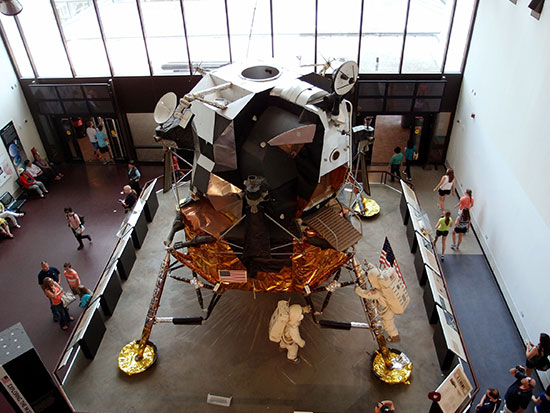DK Space: Space Travel

People began traveling in space in 1961 in tiny spacecraft called capsules, which were launched from Earth by powerful rockets. Russian crews still travel in this kind of craft, in Soyuz capsules, but Americans now travel into space in shuttles, which are rocket-powered space planes.
There is no oxygen in space, so all crewed spacecraft carry a life-support system. This supplies air for people to breathe. The system also includes equipment to keep the air at a comfortable temperature and pressure and to remove carbon dioxide and odors.
Gravity in space is much weaker than it is on Earth. When people travel in space, they seem to become weightless. This often makes them feel sick. Their bodies do not have to work as hard, because they are not fighting gravity to sit or stand up. If they stay in space for a long time, the lack of gravity makes their muscles start to waste away. Exercise and a special diet help to combat these effects.
Astronauts on the APOLLO PROJECT traveled to the Moon, about 239,000 miles (385,000 km) away. Russian cosmonaut Valeri Poliakov traveled a distance of about 174 million miles (280 million km) around Earth while in the Mir space station.
In the space race of the 1960s, the US Apollo Project beat the Soviet Union by landing the first astronauts on the Moon. The first Moon landing, by Apollo 11, took place on July 20, 1969, when Neil Armstrong and Buzz Aldrin became the first humans to set foot on another world.
The Apollo spacecraft was launched from Earth by the Saturn V rocket. On the launch pad, the whole assembly stood 365 ft (111 m) tall. The spacecraft itself weighed 50 tons (45 metric tons). It was made from three main modules (sections). The command module for flight control housed the three-person crew. The service module carried equipment, fuel, and a rocket motor. The lunar module detached from the craft and landed two astronauts on the Moon’s surface.
There were six Moon landings, beginning with Apollo 11 in July 1969 and ending with Apollo 17 in December 1972. During the missions, 12 astronauts explored the lunar surface for a total of over 80 hours and brought back nearly 880 lb (400 kg) of Moon rock and dust for examination on Earth.
